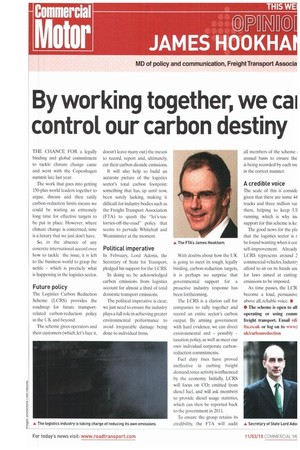By working together, we cal control our carbon destiny
Page 15

If you've noticed an error in this article please click here to report it so we can fix it.
THE CHANCE FOR a legally binding and global commitment to tackle climate change came and went with the Copenhagen summit late last year.
The work that goes into getting 150-plus world leaders together to argue, discuss and then ratify carbon-reduction limits means we could he waiting an extremely long time for effective targets to be put in place. However, where climate change is concerned, time is a luxury that we just don't have.
So, in the absence of any concrete international accord over how to tackle the issue, it is left to the business world to grasp the nettle — which is precisely what is happening in the logistics sector.
Future policy
The Logistics Carbon Reduction Scheme (LCRS) provides the roadmap for future transportrelated carbon-reduction policy in the UK and beyond.
The scheme gives operators and their customers (which, let's face it, doesn't leave many out) the means to record, report and, ultimately, cut their carbon dioxide emissions.
It will also help to build an accurate picture of the logistics sector's total carbon footprint: something that has, up until now, been sorely lacking, making it difficult for industry bodies such as the Freight Transport Association (ETA) to quash the "let's-taxlorries-off-the-road" policy that seems to pervade Whitehall and Westminster at the moment.
Political. imperative
In February, Lord Adonis, the Secretary of State for 'Transport, pledged his support for the LCRS.
In doing so, he acknowledged carbon emissions from logistics account for almost a third of total domestic transport emissions.
The political imperative is clear, we just need to ensure the industry plays a full role in achieving greater environmental performance to avoid irreparable damage being done to individual firms With doubts about how the UK is going to meet its tough, legally binding, carbon-reduction targets, it is perhaps no surprise that governmental support for a proactive industry response has been forthcoming.
The LCRS is a clarion call for companies to rally together and record an entire sector's carbon output. By arming government with hard evidence, we can direct environmental and — possibly — taxation policy as well as meet our own individual corporate carbonreduction commitments.
Fuel duty rises have proved ineffective in curbing freight demand, since activity is influenced by the economy Initially, LCRS will focus on CO2 emitted from diesel fuel, and will ask members to provide diesel usage statistics, which can then be reported hack to the government in 2011.
To ensure the group retains its credibility, the ETA will audit all members of the scheme annual basis to ensure the is being recorded by each me in the correct manner.
A credible voice
The scale of this is conside given that there are some 44 trucks and three million var there, helping to keep Ul running, which is why int support for this scheme is ke The good news for the phi that the logistics sector is r be found wanting when it cor self-improvement. Already LCRS represents around 2 commercial vehicles. Industr afford to sit on its hands am for laws aimed at cutting emissions to be imposed.
As time passes, the LCR become a loud, persuasive above all, reliable voice. 11
• The scheme is open to all operating or using comm freight transport. Email rdi fta.co.uk or log on to www.I uk/carbonreduction








































































































































